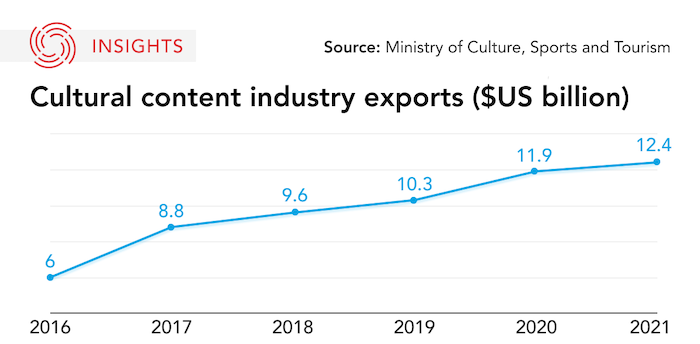The Takeaway
A recent string of massive domestic and international investments into South Korea’s cultural content industry are helping to boost the global influence of Korean culture and support the country’s regional economic development.
In Brief
On January 5, South Korea’s Ministry of Culture, Sports and Tourism (MCST) released its expanded financial support plans to nurture the cultural content industry as one of the country’s export engines. According to its ambitious plans, MCST will increase its production support for South Korean dramas and films. MCST is particularly encouraged by the huge success of Reborn Rich, which was financially supported by MCST and became one of the most watched South Korean dramas of 2022. In addition to webtoon (a type of digital comic), music, and gaming companies, South Korean film and drama producers will be eligible for direct investments or loans, and their interest costs can be further supported through government guarantee funds worth C$854 million (790 billion won).
MCST also expects that the new investments will support regional development. For instance, the ministry will establish a regional cluster for virtual effect houses and upgrade the infrastructure and equipment of several drama and film studios in non-Seoul metropolitan areas. Specifically, Studio Cube in Daejeon, where Squid Game was filmed, will be equipped with underwater cinematographic facilities this year. MCST will also provide 10,000 prospective content creators across the country with training courses over the next three years.
On January 12, MCST officially welcomed a total investment of C$1.3 billion (1.2 trillion won) in South Korea’s entertainment giant Kakao Entertainment by two foreign sovereign wealth funds, Saudi Arabia's Public Investment Fund (PIF) and the Government of Singapore Investment Corporation (GIC). MCST hopes the foreign investment will help nurture South Korea’s next internationally viral productions.
Implications

The global success of Parasite, Squid Game, and South Korean idol bands has been critical in reshaping and diversifying South Korea’s export landscape. According to the preview of the 2021 Cultural Content Industry Survey released by MCST on January 4, 2023, exports in the cultural content industry exceeded US$12.4 billion in 2021. South Korea's cultural exports have already surpassed exports of home appliances (US$8.7 billion), secondary batteries (US$8.7 billion), and display panels (US$3.6 billion) as of 2021. MCST’s current goal is to increase the value of cultural content industry exports to US$22 billion by 2027.
The cultural industry is also expected to contribute to South Korea’s soft power. South Korean music, webtoons, foods, cosmetics, films, and dramas have been reshaping inter-Korean relations, as well as South Korea’s relations with its neighbours. For example, South Korean songs, dramas, and beauty products have been smuggled into North Korean black markets and could now be one of the biggest threats to the Kim Jong Un regime, with the possibility of diluting his ideology of self-reliance and control of information. What's more, even as ties between South Korea and Japan deteriorate, many young Japanese have nothing but praise for South Korea. In one 2021 poll by a Tokyo think tank, 80 per cent of the Japanese respondents under the age of 20 — a group who typically value and follow South Korean pop culture — had a "good" impression of South Korea. They also see future bilateral relations more optimistically than all other age groups surveyed.
What's Next
- Raising cultural understanding
While the world's interest in South Korean media content has grown, there have been a series of South Korean works criticized of late for their disparaging, distorted, and “discriminatory” descriptions of other cultures and races. As South Korean content is increasingly consumed internationally, some point out that media production should go through a more thorough review process.
- Improving the production environment
According to Korea Creative Content Agency’s 2022 survey report on the working environment in the media content industry, the average weekly working hours of film or drama production staff came out at around 47 hours, and on average, workers in the media content industry worked nine nights per month (10:00 p.m. to 6:00 a.m.). Satisfaction levels among workers on employment stability, working hours, and wages are also relatively low.
- ‘Visit Korea Year’
MCST declared 2023 the Visit Korea Year to attract more international visitors and global fans of Korean culture. Korean tourism promotion events will be held in 15 overseas cities throughout the year. The 2023 Korea Grand Sale, the largest shopping festival for foreign tourists visiting South Korea, also runs from January 12 to February 28. MCST has a target for 10 million inbound tourists and related travel revenue of US$16 billion in 2023, with the ultimate goal of reaching 30 million tourists and US$30 billion in travel revenue by 2027.
• Produced by CAST’s Northeast Asia team: Dr. Scott Harrison (Senior Program Manager); Momo Sakudo (Analyst); and Tae Yeon Eom (Analyst).




